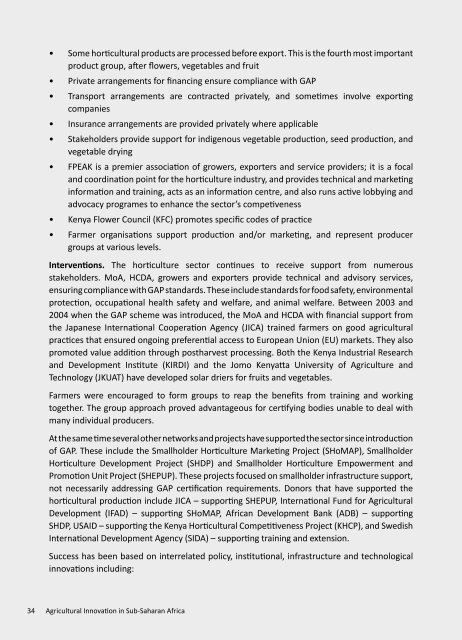1C1KKTs
1C1KKTs
1C1KKTs
Create successful ePaper yourself
Turn your PDF publications into a flip-book with our unique Google optimized e-Paper software.
• Some horticultural products are processed before export. This is the fourth most important<br />
product group, after flowers, vegetables and fruit<br />
• Private arrangements for financing ensure compliance with GAP<br />
• Transport arrangements are contracted privately, and sometimes involve exporting<br />
companies<br />
• Insurance arrangements are provided privately where applicable<br />
• Stakeholders provide support for indigenous vegetable production, seed production, and<br />
vegetable drying<br />
• FPEAK is a premier association of growers, exporters and service providers; it is a focal<br />
and coordination point for the horticulture industry, and provides technical and marketing<br />
information and training, acts as an information centre, and also runs active lobbying and<br />
advocacy programes to enhance the sector’s competiveness<br />
• Kenya Flower Council (KFC) promotes specific codes of practice<br />
• Farmer organisations support production and/or marketing, and represent producer<br />
groups at various levels.<br />
Interventions. The horticulture sector continues to receive support from numerous<br />
stakeholders. MoA, HCDA, growers and exporters provide technical and advisory services,<br />
ensuring compliance with GAP standards. These include standards for food safety, environmental<br />
protection, occupational health safety and welfare, and animal welfare. Between 2003 and<br />
2004 when the GAP scheme was introduced, the MoA and HCDA with financial support from<br />
the Japanese International Cooperation Agency (JICA) trained farmers on good agricultural<br />
practices that ensured ongoing preferential access to European Union (EU) markets. They also<br />
promoted value addition through postharvest processing. Both the Kenya Industrial Research<br />
and Development Institute (KIRDI) and the Jomo Kenyatta University of Agriculture and<br />
Technology (JKUAT) have developed solar driers for fruits and vegetables.<br />
Farmers were encouraged to form groups to reap the benefits from training and working<br />
together. The group approach proved advantageous for certifying bodies unable to deal with<br />
many individual producers.<br />
At the same time several other networks and projects have supported the sector since introduction<br />
of GAP. These include the Smallholder Horticulture Marketing Project (SHoMAP), Smallholder<br />
Horticulture Development Project (SHDP) and Smallholder Horticulture Empowerment and<br />
Promotion Unit Project (SHEPUP). These projects focused on smallholder infrastructure support,<br />
not necessarily addressing GAP certification requirements. Donors that have supported the<br />
horticultural production include JICA – supporting SHEPUP, International Fund for Agricultural<br />
Development (IFAD) – supporting SHoMAP, African Development Bank (ADB) – supporting<br />
SHDP, USAID – supporting the Kenya Horticultural Competitiveness Project (KHCP), and Swedish<br />
International Development Agency (SIDA) – supporting training and extension.<br />
Success has been based on interrelated policy, institutional, infrastructure and technological<br />
innovations including:<br />
34 Agricultural Innovation in Sub-Saharan Africa


